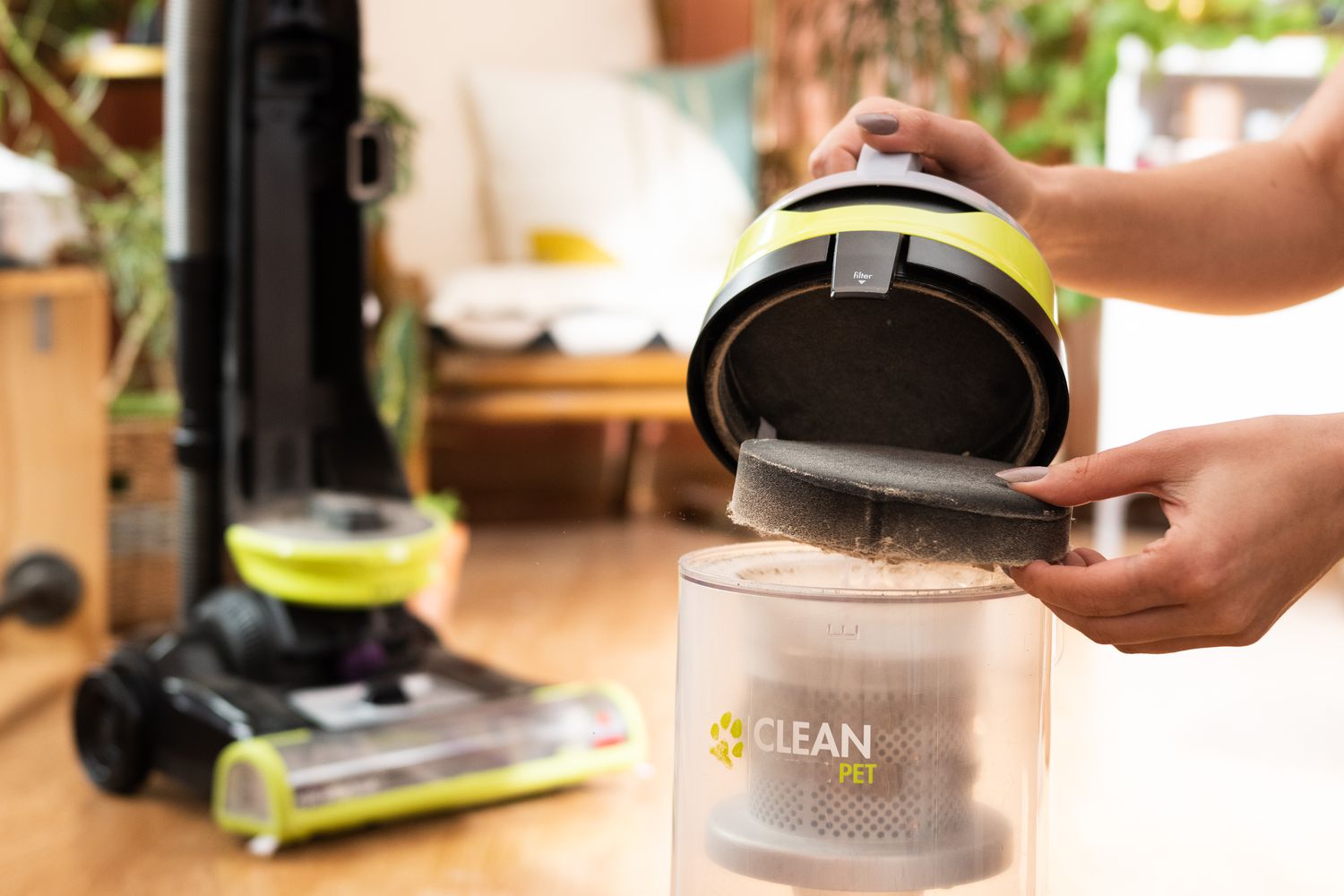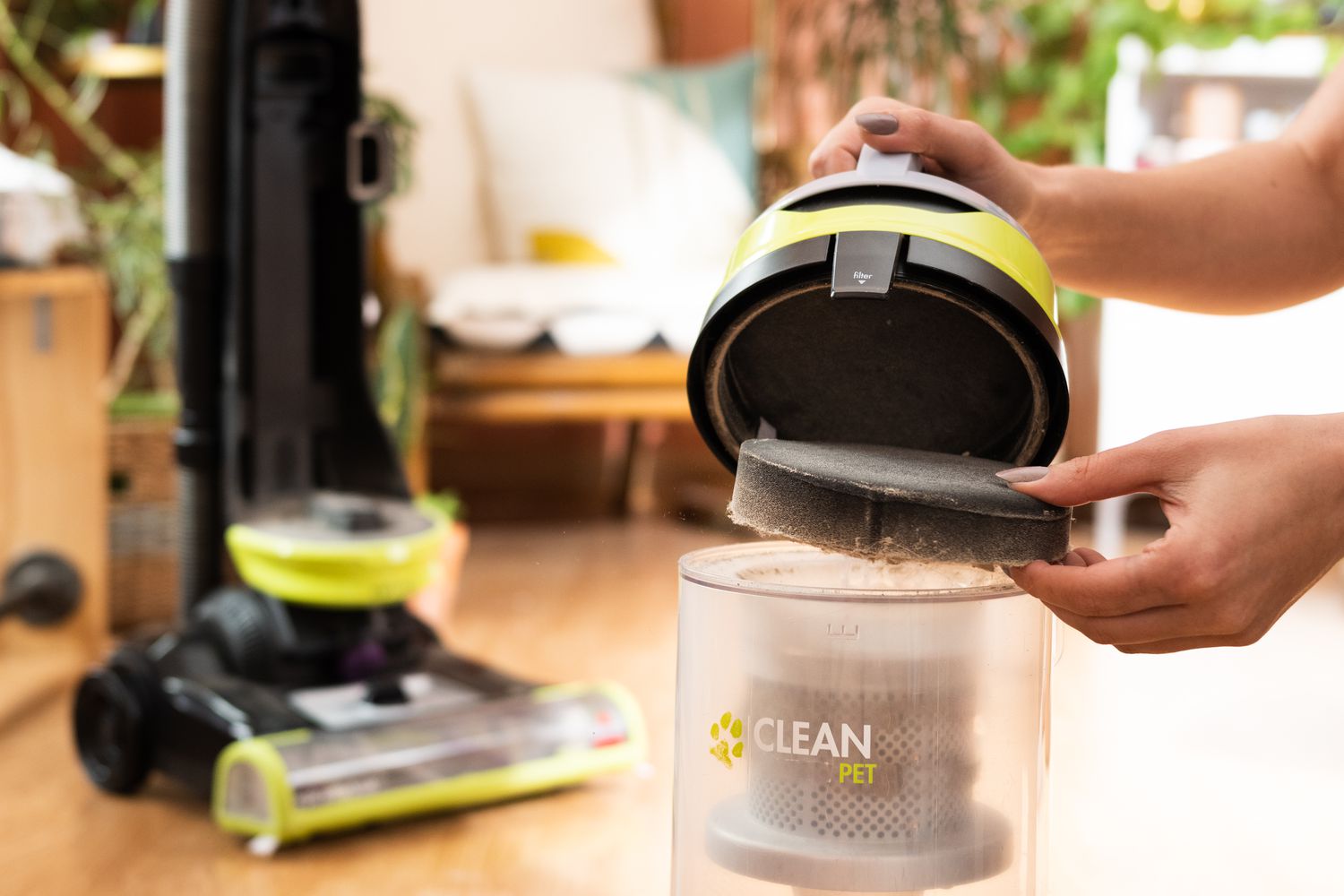Vacuum cleaners are a powerful tool that we use to keep our homes clean and tidy. But have you ever stopped to wonder what happens to all the dust and dirt that gets sucked up into the machine? Well, that’s where the vacuum cleaner filter comes in. It plays a crucial role in keeping the air clean and preventing the dust from escaping back into your home.
Now, the question is, can you wash a vacuum cleaner filter? The answer is yes, but it depends on the type of filter your vacuum cleaner has. In this article, we will explore the different types of filters and provide you with a step-by-step guide on how to clean them, so you can keep your vacuum cleaner running smoothly and effectively.

Can You Wash a Vacuum Cleaner Filter?
Vacuum cleaners are essential tools for keeping our homes clean and tidy. They help us remove dust, dirt, and debris from our carpets, floors, and furniture. However, to keep the vacuum cleaner working effectively, we must ensure that we maintain it properly. One of the critical components of a vacuum cleaner is the filter. The filter traps the dust and dirt, preventing them from being released back into the air. Over time, the filter can become clogged, reducing the suction power of the vacuum cleaner. In this article, we will answer the question, “Can you wash a vacuum cleaner filter?” and provide you with some tips on how to clean vacuum cleaner filters properly.
Types of Vacuum Cleaner Filters
Before we discuss how to clean vacuum cleaner filters, let’s take a look at the different types of filters available. There are several types of filters used in vacuum cleaners, such as HEPA filters, foam filters, and paper filters. HEPA filters are the most effective filters and can capture up to 99.97% of particles as small as 0.3 microns. Foam filters are washable and can be reused multiple times, while paper filters are disposable and need to be replaced regularly.
Cleaning HEPA Filters
HEPA filters are the most effective filters used in vacuum cleaners. They are capable of capturing tiny particles that other filters may miss. However, they can become clogged quickly, reducing the suction power of the vacuum cleaner. To clean a HEPA filter, follow these steps:
1. Remove the filter from the vacuum cleaner.
2. Tap the filter gently to remove any loose dust and dirt.
3. Use a soft brush to remove any remaining dust and dirt from the filter.
4. Rinse the filter under running water, ensuring that you do not use any soap or detergent.
5. Allow the filter to dry completely before reinstalling it in the vacuum cleaner.
Cleaning Foam Filters
Foam filters are washable and can be reused multiple times. Cleaning foam filters is a simple process and can be done in a few easy steps:
1. Remove the foam filter from the vacuum cleaner.
2. Rinse the filter under running water, ensuring that you remove any dirt and debris.
3. Fill a container with warm water and add a few drops of mild detergent.
4. Soak the filter in the solution for 10-15 minutes.
5. Rinse the filter thoroughly under running water.
6. Squeeze the excess water from the filter.
7. Allow the filter to dry completely before reinstalling it in the vacuum cleaner.
Cleaning Paper Filters
Paper filters are disposable and need to be replaced regularly. However, if you want to extend the life of your paper filter, you can clean it using the following steps:
1. Remove the paper filter from the vacuum cleaner.
2. Tap the filter gently to remove any loose dust and dirt.
3. Use a soft brush to remove any remaining dust and dirt from the filter.
4. Replace the filter if it is too dirty or damaged.
Benefits of Cleaning Vacuum Cleaner Filters
Cleaning vacuum cleaner filters regularly has several benefits. Here are a few:
1. Maintains Suction Power: Over time, vacuum cleaner filters can become clogged with dust and debris, reducing the suction power of the vacuum cleaner. Cleaning the filters regularly ensures that the vacuum cleaner works at its optimal level, picking up dirt and debris effectively.
2. Improves Indoor Air Quality: Vacuum cleaner filters play a critical role in preventing dust and allergens from being released back into the air. Cleaning the filters regularly can improve indoor air quality and reduce the risk of allergies and respiratory problems.
3. Extends the Life of the Vacuum Cleaner: Regular maintenance of the vacuum cleaner, including cleaning the filters, can extend the life of the vacuum cleaner, saving you money in the long run.
Washing vs. Replacing Vacuum Cleaner Filters
While washing vacuum cleaner filters is a cost-effective way to maintain them, there comes a time when you will need to replace them. Here are some signs that indicate that you need to replace your vacuum cleaner filter:
1. The filter is torn or damaged.
2. The filter is too dirty and cannot be cleaned effectively.
3. The vacuum cleaner is not picking up dirt and debris effectively, even after cleaning the filter.
In conclusion, cleaning vacuum cleaner filters regularly is essential to maintain the suction power of the vacuum cleaner and improve indoor air quality. While washing vacuum cleaner filters is a cost-effective way to maintain them, it is essential to replace them when they are damaged or too dirty to clean.
Freequently Asked Questions
Here are some frequently asked questions about whether you can wash a vacuum cleaner filter:
Can you wash a vacuum cleaner filter?
Yes, you can wash some vacuum cleaner filters. However, it is important to check the manufacturer’s instructions before washing the filter. Some filters are not washable and must be replaced. If you wash a filter that is not designed to be washed, you may damage it or reduce its effectiveness.
If the filter is washable, you should remove it from the vacuum cleaner and gently wash it with warm water and mild soap. Be sure to rinse the filter thoroughly and allow it to dry completely before putting it back in the vacuum cleaner. Washing the filter regularly can help extend its lifespan and improve the vacuum cleaner’s performance.
How often should you wash a vacuum cleaner filter?
The frequency with which you should wash a vacuum cleaner filter depends on how often you use the vacuum. If you use the vacuum every day, you may need to wash the filter once a month. If you use the vacuum less frequently, you may only need to wash the filter every three to six months.
However, it is important to check the manufacturer’s instructions for specific recommendations on how often to wash the filter. Some filters may need to be washed more frequently, while others may only need to be washed once or twice a year.
What happens if you don’t wash a vacuum cleaner filter?
If you don’t wash a vacuum cleaner filter, it can become clogged with dirt, dust, and debris. This can reduce the effectiveness of the vacuum cleaner and make it harder to pick up dirt and debris from carpets and floors.
In addition, a dirty filter can cause the vacuum cleaner to overheat, which can damage the motor and other parts of the vacuum. Over time, this can lead to costly repairs or the need to replace the vacuum cleaner altogether. Regularly washing the filter can help prevent these issues and keep your vacuum cleaner running smoothly.
Can you wash a HEPA filter?
HEPA filters are designed to capture small particles like dust, pollen, and pet dander. While some HEPA filters are washable, others are not. It is important to check the manufacturer’s instructions before attempting to wash a HEPA filter.
If the HEPA filter is washable, you should remove it from the vacuum cleaner and gently wash it with warm water and mild soap. Be sure to rinse the filter thoroughly and allow it to dry completely before putting it back in the vacuum cleaner. However, if the filter is not washable, you will need to replace it when it becomes dirty or clogged.
Can you use a vacuum cleaner without a filter?
No, you should never use a vacuum cleaner without a filter. The filter is an important part of the vacuum cleaner’s system and helps to trap dust, dirt, and other particles. Without a filter, these particles can be released back into the air, which can aggravate allergies and respiratory issues.
In addition, using a vacuum cleaner without a filter can cause damage to the motor and other parts of the vacuum. Over time, this can lead to costly repairs or the need to replace the vacuum cleaner altogether. If your vacuum cleaner’s filter is damaged or needs to be replaced, be sure to do so before using the vacuum cleaner again.
How to Effectively Clean a Vacuum Cleaner Filter 2021 | Cleaning HEPA Filter
In conclusion, washing a vacuum cleaner filter is not only possible, but it is also recommended. By washing the filter, you can ensure that your vacuum cleaner continues to function efficiently and effectively. Additionally, washing the filter can help to prolong the life of your vacuum cleaner, saving you both time and money in the long run.
However, it is important to note that not all vacuum cleaner filters are washable. It is essential to check the manufacturer’s instructions before attempting to wash the filter. Failure to do so may result in damage to the filter or the vacuum cleaner itself.
In summary, washing a vacuum cleaner filter is a simple yet effective way to maintain the performance of your vacuum cleaner. Just remember to check the manufacturer’s instructions before attempting to wash the filter, and you’ll be on your way to a cleaner and more efficient home in no time!

